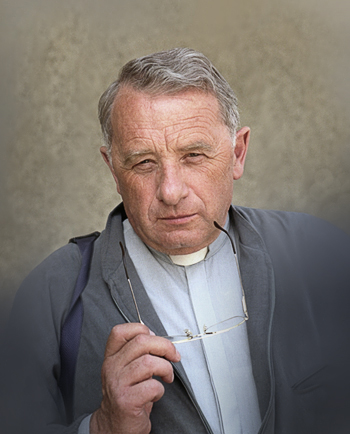
Józef Stanisław Tischner – a Polish priest, a philosopher. He was born on 12 March 1931 in Stary Sącz. He was the eldest son of Józef and Weronika (family name: Chowaniec) who were teachers at the school in Łopuszna (their other sons’ names were Marian and Kazimierz). In 1937 he started his education at the local school. When the Second World War broke out, the Tischner family had to move to Chabówka, then to Raba Wyżna, and in 1942 – to Rogoźnik. After the war, Tischner graduated from the junior high school in Nowy Targ. In 1949 he passed his finals at the Seweryn Goszczyński (humanistic) secondary school in Nowy Targ. The same year Józef Tischner started studying, first at the Faculty of Law of the Jagiellonian University (UJ), and then – as early as in May 1950 – he submitted documents to the Metropolitan Seminary in Krakow and moved from the Faculty of Law to the faculty of Theology. On 26 June 1955 he was ordained priest at the Wawel Cathedral by bishop Franciszek Jop. After ordination he continued his studies at the Faculty of Christian Philosophy of the Academy of Catholic Theology in Warsaw. In 1959 he obtained the master’s degree at the Faculty of History and Philosophy of UJ, and then, under the supervision of prof. Roman Ingarden, he wrote the doctoral thesis entitled “Ja transcendentalne w filozofii E. Husserla” [The Transcendental I in the Philosophy of E. Husserl]. After obtaining the doctor’s degree in 1963, he became a lecturer at the Pontifical Faculty of Theology in Krakow. While preparing the dissertation “Ja aksjologiczne” [Axiological I] for the postdoctoral degree, in the university year 1968/69 he fulfilled his scientific scholarship in Louvain. In 1974 he obtained his postdoctoral degree. During the August strikes of 1980 Tischner was abroad. He came back to Poland in September as an associate professor to continue his work at the Pontifical Faculty of Theology and to give lectures on “The Philosophy of Human Tragedy” at the National Academy of Theatre Arts in Krakow and at the Faculty of Philology of UJ. On 19 October 1980 he preached a famous sermon (“Solidarność sumień” [The Solidarity of Consciences]) at the Wawel Cathedral to the leaders of the Independent and Self-Governing Trade Union “Solidarity” (NSZZ “Solidarność”), and in 1981 he published “Etyka solidarności” [The Ethics of Solidarity]. In 1981 he became the first dean of the Faculty of Philosophy of the Pontifical Academy of Theology (PAT) in Krakow. Also, he was a co-founder (with Hans-George Gadamer and Krzysztof Michalski) and a president of the International Institute for Human Sciences in Vienna (1981). In 1997 he was re-elected to be the dean of the Faculty of Philosophy of PAT. Rev. prof. Józef Tischner died in Krakow on 28 June 2000. To honour his scientific achievements, the University of Łódź (1995) and the Pedagogical University of Krakow (1996) granted him a honorary doctor’s degree, and to honour his social merits Polish authorities awarded him with the Order of the White Eagle (1999).
In 1982 the following books by Tischner appeared: “Myślenie według wartości” [Thinking According to Values], “Podstawy etyki – jak żyć?” [The Basics of Ethics – How to Live?]. In 1984 “Etyka wartości i nadziei” [The Ethics of Values and Hopes] was published, and in 1985 – the collection of philosophical dissertations on human work: “Polska jest Ojczyzną” [Poland is Homeland]. He also published: the handbook “Filozofia współczesna” [Contemporary Philosophy] (1989); Das menschliche Drama: phänomenologische Studien zur Philosophie des Dramas (Wilhelm Fink Verlag, 1989, Polish version – “Filozofia dramatu” [The Philosophy of Drama], 1990); a handbook for the philosophy of man: “Zarys filozofii człowieka dla duszpasterzy i artystów” [The Outline of the Philosophy of Man for Priests and Artists] (1991); the collection of essays “Polski młyn” [The Polish Mill] (1991); “Spowiedź rewolucjonisty” [The Confession of a Revolutionist] (1993), “Czytając ‘Fenomenologię ducha’ Hegla” [Reading Hegel’s ‘Phenomenology of Spirit’] (1993), “Nieszczęsny dar wolności” [The Unfortunate Gift of Freedom] (1993); “Między Panem a Plebanem. Rozmowy ks. Tischnera z J. Żakowskim i A. Michnikiem” [Between the Ruler and the Priest: Dialogues of Fr. Tischner with J. Żakowski and A. Michnik] (1995); “Tischner czyta Katechizm” [Tischner Is Reading Catechism] (1996); “W krainie schorowanej wyobraźni” [In the World of Sick Imagination] (1997); “Spór o istnienie człowieka” [The Dispute on the Existence of Man] (1997); “Ksiądz na manowcach” [A Priest Going Astray] (1999); “Przekonać Pana Boga” [To Convince God] (1999).
Józef Tischner’s main philosophical interests include anthropological, ethical, axiological and social issues within which he developed the problem of axiological “I,” meeting and dialogue, drama and freedom, as well as moral good and evil. He combined scientific activity with pastoral and social ministry.
